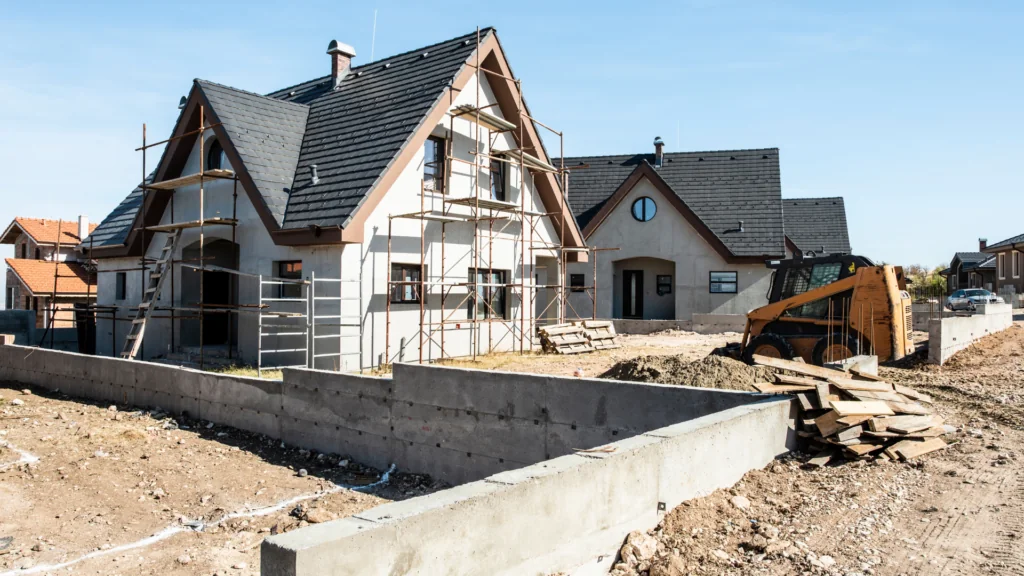- What is Development Finance?
- What is a Development Finance Broker?
- Top Reasons To Use a Development Finance Broker
- What Can a Development Finance Broker Do for You?
- Is the Expense of a Development Finance Broker Worth It?
- Should You Approach Lenders Directly?
- Can You Secure 100% Development Finance Through a Broker?
- The Bottom Line: How To Find Your Ideal Broker?
Why You Need a Development Finance Broker on Your Side

In property development, sorting your finances can often be the deciding factor in your project’s success. Whether you’re eyeing a line of townhouses or a towering apartment block, you need money solutions that fit your plans like a glove.
To make this happen, you will need a development finance broker.
These experts not only connect you with top-tier lenders but also ensure you get the most bang for your buck.
And the best part? They handle all the tedious paperwork, freeing you up to concentrate on your development plans.
In simple terms, a broker becomes your financial partner, letting you focus more on building than on bean-counting.
But let’s be clear: not all brokers are cut from the same cloth. That’s why in this article, we’ll discuss how a good broker can totally change the way you approach financing, the benefits of hiring one, and tips to find the one that’s perfect for you.
What is Development Finance?
Development finance is a specialised form of lending tailored specifically for property projects.
Generally, these are short-term loans with higher interest rates and drawdown facilities you can tap into throughout the loan term.
This unique lending solution offers the flexibility you need in various stages of your project. Whether you’re buying land, property, or an entire development site, development finance can cover up to 100% of your costs from start to finish.
What is a Development Finance Broker?
A development finance broker is your go-to expert in property financing. You can think of them as a matchmaker who pairs you up with the right lenders for your project.
With expertise in the specific lending needs of property developers, they have the inside track on finding options that best suit your situation.
Top Reasons To Use a Development Finance Broker
You might think, “Why can’t I just find a lender myself?” Well, you could, but having a broker saves you time, effort, and potentially money.
They have pre-existing relationships with a range of lenders, understand the intricate details of loan agreements, and they negotiate terms with your best interests in mind.
In short, they remove the headache from the process, letting you focus on your project.
But, if you’re on the fence about whether or not to consult a broker, here are some compelling reasons that might tip the scales in favour of making that call:
Access to Exclusive Lenders
Some lenders prefer to work only through intermediaries. So, if you’re looking for a broader range of lending options, a broker is your ticket to this exclusive club.
Delegate to Concentrate
Managing a property development project involves juggling numerous tasks simultaneously. By allowing a broker to handle your financing, you free up your time and energy to focus on what you do best — developing properties.
Get the Best Bang for Your Buck
An adept broker not only knows where to find the best rates but also how to ensure you’re eligible for them. They assess all costs, including hidden fees, to guarantee you’re getting the most value for your money.
Speed Matters
Brokers have built long-standing relationships with various lenders, giving them insights into who is most likely to greenlight your project. This speed in the process could be a game-changer in helping you get a jump on your development timeline.
What Can a Development Finance Broker Do for You?
Earlier, we talked about why you might want a development finance broker on your side. Now let’s get down to brass tacks on what these professionals do for you, step by step:
- Detailed Consultation – First, the broker will sit down with you for an in-depth chat. They’ll look at your project from all angles—what you plan to build, how long it will take, and how much it’s going to cost.
- Finding the Right Lender – This isn’t just about connecting you with any lender. The broker uses their industry knowledge to find a lender who’s a good fit for your exact needs.
- Sorting Paperwork – Let’s be honest, paperwork is a drag. Your broker takes care of collecting all the needed documents, making sure your loan application is strong.
- Negotiating with Lenders – Have you ever tried negotiating loan terms? It’s tough if you’re not an expert. Your broker will handle the back-and-forth with the lender, aiming to get you the best terms possible.
- Getting Approval – After the application is in, the broker keeps tabs on it. They’ll deal with any follow-up questions and make sure everything stays on track.
- Ongoing Support – Your broker sticks with you even after the loan is secured. They’ll be there for any more financing needs or project hitches that come up.
This breakdown should give you a clear idea of how a development finance broker doesn’t just help you get a loan. They guide you through the entire lending process, making it easier and tailored to your project’s needs.
Is the Expense of a Development Finance Broker Worth It?
There’s an old saying: you have to spend money to make money. This holds true when considering the value of a development finance broker.
Yes, brokers charge a fee, often up to 2% of the loan amount. But the benefits far outweigh the cost. Here’s why:
- Time-Saving. Brokers accelerate the financing process, helping you get started on your project sooner.
- Expertise. They understand the intricacies of this specialised financing type, minimising potential pitfalls.
- Best Rates. Through brokers, you gain access to the most competitive rates in the market.
- Streamlined Process. Brokers manage all the paperwork and negotiations, allowing you to focus solely on your project.
In a nutshell, that 1% to 2% fee for a broker’s services is a solid investment. It smoothens the pathway to securing your loan and brings a whole host of advantages that could actually save you money in the long run.
Should You Approach Lenders Directly?
You could, in theory, go directly to lenders for your development finance, but that might be a risky move. Here’s why:
- Increased Risk. Property development is viewed as a high-stakes endeavour by the financial market. Factors like market volatility and ever-changing regulations make lenders particularly cautious. Approaching them without a broker could raise eyebrows, potentially affecting your loan approval.
- Lack of Expertise. A broker’s role isn’t just to connect you to lenders; they prepare you for what’s to come. They assist in gathering the necessary documentation and fine-tuning your application to highlight its strengths. Without this expert guidance, you run the risk of an under-prepared application that may not pass muster.
- Limited Negotiating Power. Brokers have industry leverage that you as an individual may not possess. They can negotiate more favourable terms and secure better rates, which could make a world of difference in the overall cost of your project.
While it’s technically possible to go the solo route, you’re likely better off with a broker in your corner. They bring a distinct edge to the table, dramatically increasing your odds of securing the best financing options available for your project.

Can You Secure 100% Development Finance Through a Broker?
With a seasoned broker by your side, the answer might be yes. However, don’t expect it to be a walk in the park.
Brokers can link you with specialised lenders willing to offer full financing, but conditions apply. The project’s feasibility, your financial standing, and sometimes additional collateral like other assets may be scrutinised before approval.
Given the higher costs associated with 100% financing, it’s wise to have an in-depth discussion with a broker. They can guide you through the maze of specialist lenders and help you figure out if such a loan is achievable and sensible for you.
The Bottom Line: How To Find Your Ideal Broker?
By now, you should have a comprehensive understanding of what development finance is and the indispensable role that a development finance broker plays in the process.
From saving you time and effort to using their industry insights for your benefit, brokers are more than just a middleman—they’re a valuable asset for any serious property developer.
They’re not just about finding a lender; they offer a tailored approach to suit your project’s unique requirements. Whether it’s securing the most competitive rates or guiding you through the complex paperwork and negotiations, they’re with you every step of the way.
Yes, they charge a fee, but the advantages they bring could very well save you money and stress in the long run.
To find your ideal broker, reach out to us. We’ll connect you with a development finance broker who can ensure you get the most value out of your property development project.
Get Matched With Your Dream Mortgage Advisor...

Frequently asked questions
Can a broker assist me if I have bad credit?
Yes, a broker can help. Having bad credit doesn’t mean all doors are closed. Brokers have insider knowledge and relationships that can point you toward lenders willing to work with less-than-perfect credit histories. But remember, it’s always a good idea to get personalised advice tailored to your situation.
How quickly can I get development finance?
Timeframes can differ, but if you’re in a rush, some short-term loans can be secured in just a week. Your broker can guide you through this.
What kind of interest rates can I expect?
Interest rates can swing between 7% and 15%, depending on several factors like your project’s risk level and your own expertise in property development.
What documents do I need?
Preparing for development finance isn’t as simple as getting a regular home loan. You’ll need to offer:
- An application form
- CV outlining your development experience
- Financial statements, including asset and liability, as well as income and expenditure reports
- Annual accounts or tax returns, if applicable
- Valuation and quantity surveyor (QS) reports
- Project details, including location and cost estimates
- A comprehensive development appraisal, including proposed specification and finish
- Timeline and cash-flow forecast that considers preliminary costs, construction, and a realistic sales window
- Planning permissions and plans, including accommodation schedule
- Comparables for sale and rent in your area
- List of your project team, including their CVs and financial accounts, to demonstrate their ability to deliver the project
What hidden costs should I watch out for?
While a low interest rate might look tempting, be wary of hidden fees. Here’s a breakdown:
- Interest Rate – Check if it’s fixed or compounded. Also, find out if interest is charged on undrawn funds.
- Lender’s Fees – Are they added to the loan and do they accrue interest? Is the fee based on the loan amount or the Gross Development Value (GDV)?
- Exit Fees – This could be based either on the loan amount or the GDV, which can be a massive variable cost for you.
- Legal and Valuation Fees – Always cover your bases by knowing both your and the bank’s legal costs upfront, along with any valuation fees, including ongoing monitoring fees.
Who can be a property developer?
You don’t need formal qualifications, but you do need market understanding and a skilled team, especially since some lenders are wary of new developers.
How can I gain property development experience?
Starting with a property requiring light refurbishment is a good step. As you gain experience, you can take on more complex projects.




